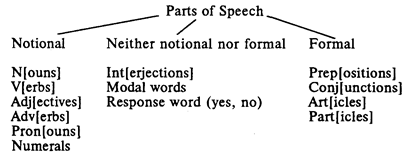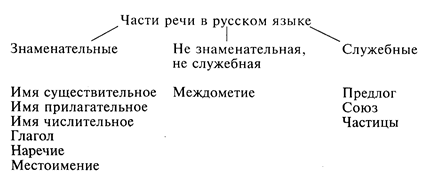Учебное пособие: Консультации по английской грамматике В помощь учителю иностранного языка
If a group of words have the common lexical meaning of thingness (in a wide sense of the word); have the forms player — players, player — player's, players — players'; are connected with adjectives, verbs, articles, prepositions, and can be subject, object, predicative, attribute and adverbial modifier in a sentence, they are united together under the name of nouns (N for short).
If the words have the common lexical meaning of action (in a wide sense of the word), have the forms play — plays, play — played — will play, plays — is playing, plays — is played, play — have played, etc.; are connected with nouns, adjectives and adverbs; can be predicate in a sentence, they are united together under the name of verbs (V for short).
If the words have the common lexical meaning of property, have the forms kind — kinder — kindest; are connected with nouns, adverbs, verbs; and can be attribute or predicative in a sentence, they are united together under the name of adjectives (A for short).
If the words have the common lexical meaning of characteristic of a property or of an action, if they are unchangeable in form or can have the forms fast — faster — fastest; if they are connected with adjectives and verbs and can perform the function of adverbial modifier in a sentence, they are united under the name of adverbs (Adv for short).
The study of the language resulted in naming certain parts of speech, they are presented in the following chart.

The symbolic presentation of parts of speech will make the process of teaching and learning the language more economizing and more enjoyable. It will also make the process of learners' looking up words in the dictionary easier. The symbols will allow students to take quick notes. Symbols are part of linguistic literature and knowing them will pave the way to understanding further reading on linguistic topics.
The parts of speech picture should necessarily be compared with what exists in the Russian language.

The comparison of the English and Russian parts of speech systems shows that they are identical with one substantial difference: there's the article in the English language, and no articles are to be found in the Russian language. As to modal words, they can be treated as a group of adverbs (some linguists do so), the words Yes and No are only two in number and may be moved to Interjections.
English notional parts of speech have been attended to so far. Now we'll mention most important features of formal words and those words which are neither notional nor formal.
Formal words are subdivided into connecting and determining. The connecting formal words are prepositions (prep) and conjunctions (conj). Prepositions show the relation of the noun to words of other parts of speech in a sentence. They are unchangeable words connecting the noun, the pronoun, the gerund, infinitival and gerundial phrases, noun-clauses with the noun, adjective and the verb in a sentence. Being formal words they do not perform any function in a sentence.
Conjunctions (conj) have the meaning of connection, they are unchangeable and connect words of the same parts of speech: N conj N, A conj A, V conj V, Adv conj Adv, N/Pron conj N/Pron, etc. No syntactical function is performed by them.
The determining formal words are articles (art) and particles (part). They have a peculiar meaning and are unchangeable. They determine notional parts of speech: the article determines nouns (art + N) and particles determine any notional part of speech for emphasis, e.g. Only he did so. He did only this. He only listened but did nothing. They do not perform the functions of subject, predicate, object, etc. in a sentence, they emphasize the meaning of the word they modify.
Interjections (int) express human emotions, they are unchangeable, they make a sentence in themselves, e.g. Oh, how happy I feel, and are often homonymous with notional words, e.g. My God , here you are at last.
Words Yes and No express affirmation and negation; they are unchangeable and make a sentence in themselves.
Modal words express the attitude of the speaker to what is said and are used as parentheses. E.g. Luckily, no one suffered from it. Honestly, you are making the most of it.
Here is a poem written by someone unknown about the parts of speech in English.
Grammar in Rhyme
Three little words you often see,
Are Articles A, An and The.
A Noun is the name of anything,
As School, or Garden, Hoop, or Swing.
Adjectives tell the kind of Noun,
As Great, Small, Pretty, White, or Brown.
Instead of Adjectives the Pronouns stand,
Her head, His face, Your arm, My hand.
Verbs tell of something being done —
To Read, Count, Laugh, Sing, Jump, or Run.
How things are done the Adverbs tell,
As Slowly, Quickly, Ill, or Well.